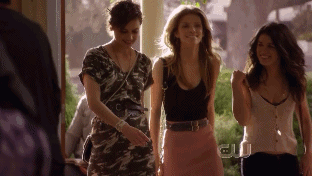This week, we are doing a show whose title is a
postcode. Only, it’s called a zipcode in
American. As always, they’ve taken a
concept and given it a jazzy name that deserves the sunglasses face emoji, and
we’ve made it sound ornamental and begrudgingly functional, like a National
Trust tearoom. But this isn’t just any
postcode, this is 90210. Even the sequence of numbers can conjure
images of sexy beaches and palm tree-lined boulevards: yet another challenge of
growing up British, where my home postcode was KT22 9PE. What did that tell you about the place? Not much, beyond the fact it was a
forty-minute drive from Kingston-Upon-Thames, which wasn’t even a real town,
but a bit of London with its own John
Lewis. But 90210 wasn’t aspirational
due to its digits, but because of its association with Beverly
Hills, 90210, the teen programme that ran for the whole of the nineties and
from whose memory this week’s show emerged years later in 2008. From a young age, I knew 90210 to be a thing,
but I thought Beverly Hills was just a famous lady or one of my mum’s friends
with an impulse perm. Either way, at the
age of 23, a version of the IP came along for me on e4 and I was hooked from the
start.
Ticking my first box was the setting. We had both the fish-out-of-water schtick,
and shiny US high school. The initial
premise revolved around the Wilson family, returning to LA from down-to-earth
Wichita to look after a grandmother (played by Arrested
Development’s and Archer’s Jessica Walter). Through the eyes of their kids, we entered a
privileged world, adopting a trope done so many times before. In fact, at one point, 70% of all television
was about people coming to LA who were not from there and having to stay true
to their hearts while existing alongside dogs in handbags. But what about the bloody kids? There was biological daughter Annie. She was a dick. Well, not really, but I remember getting more
and more annoyed by her over the course of the five series. A highlight for me was her taking part in the
school production of Spring Awakening, but only because it was a play I had
studied in its original German (shout out to all my Frühlings Erwachen
fans yeah) at university. She was a good
kid who made bad choices so often, it became fun to watch her suffer. On the other hand, her adopted brother,
Dixon, also had the same appalling track record, but was able to laugh most
things off with a little chuckle that was his response to everything. Tristan Wilds had
previously appeared in a series of The Wire,
but as I watched that after 90210, I was alarmed to see this Beverly Hills jock
as a child drug dealer. But then I
remembered about acting and that.
Joining Annie and Dixon at high school are a parade of
beautiful people. Memorable among them
was Naomi, running the show as chief mean girl, but also dominating the script
with all the best lines. But don’t
worry, she learned there was more to life than being cool when she fell for one
of the school geeks and dressed up as a Na’vi from Avatar for him. She looked really convincing. Her best mate was bad girl Adrianna
Tate-Duncan, who combined teen pregnancy with drug abuse, all while I don’t
think anyone ever explained her double-barrelled surname. Not that it needs explaining, but you rarely
see these in fictional characters, so I have been obsessed with it ever
since. I enjoyed self-righteous scarf-wearer
Silver, but she often veered into being nothing more than a conduit for mental
health storylines. Similarly, Teddy went
from background jock to reason to have a coming out storyline. 90210 aimed well in its attempts to tackle
issues, but they were always wedged into the plots like shirts you can’t fit in
a wardrobe because it’s too full of hangers.
I’ll dwell briefly here to slag off Navid as well. I enjoyed his Iranian mother getting
disappointed by him, but his need to wear waistcoats over t-shirts can, I
realise now, be blamed for some terrible outfit choices of my own. And he had a weak chin, which, as we all
know, should never ever be teamed with boyband hair. Unacceptable.
But if this new generation weren’t enough to draw in the viewers, the stars
from the original Beverly Hills, 90210 also cropped up in the high school
corridors, providing continuity but only if you had paid attention to old
storylines from around a decade beforehand.
I hadn’t, so I would lose myself in tracing the plastic surgery lines on
their faces while they did their acting and failed to hide the joy behind their
eyes that they were being paid to work again.
Ultimately, the descriptor for this show is unashamed. Everything 90210 did, it did unashamedly,
legitimised by its predecessor. It was
unashamedly Californian and unashamed in reflecting that aesthetic. It was welcome as an escape from drizzly
London life, particularly when I remember the terrible roles and low salaries I
fulfilled and earned at the time of its broadcast. I could ignore being dragged into adult life
by looking at wealthy American teenagers.
These days, grown-up reminders slap me in the face every time I open my
eyes: my friends have birthed further babies, my conveyancers want more bank
statements or colleagues need actual line managing. My postcode now has SW4 at the front, which
you either associate with a chavvy festival for pill-heads or with a London
suburb so preoccupied with brunching and Instagraming that someone has
thoughtfully spray-painted “welcome to Wankerville” on the railway
bridge as you enter Clapham. I know
where I’d sometimes rather be: in Beverly Hills (the bit in LA, not inside my
mum’s friend).






No comments:
Post a Comment